Superhero Cecily: Patti Murin and Colin Donnell Recount Their Infant's Open-Heart Surgery
Cecily Donnell was born with a hole in her heart, but got through it like a champ at 10 weeks old.
Cecily Donnell has seen a lot since she came into this world on July 14. At 10 weeks old, the daughter of Patti Murin and Colin Donnell had surgery to repair a hole in her heart that was discovered on a routine ultrasound when Murin was 22 weeks pregnant. This is not abnormal; a lot of babies are born with this condition and they usually close up on their own. But Cecily's case was different; the hole was relatively large and impacted all aspects of her young life, including weight gain and breathing.
Nearly two months since her surgery, Cecily — named after a song from the off-Broadway musical Fly by Night, in which Murin starred — has recovered like a champion. Her parents, too, are recovering, but from the trauma of watching your infant undergo open-heart surgery. They went public with their story on Halloween, sharing photos of Cecily dressed as Captain Marvel on social media. Here, they go into more detail to shine the spotlight on their superhero doctors, nurses, and beautiful daughter.
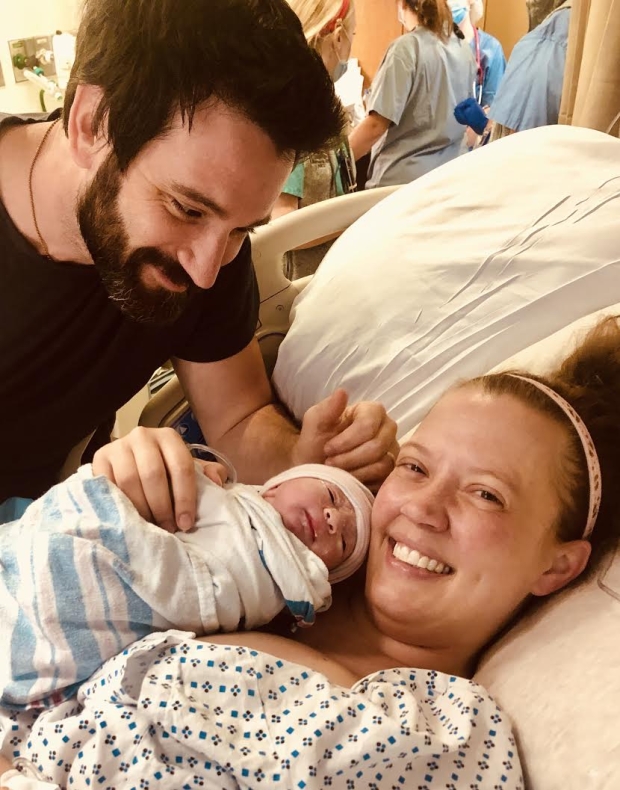
(image provided by Patti Murin)
This conversation has been condensed and edited for clarity.
At what point during the pregnancy did you find out that something was wrong?
Colin Donnell: We went for one of Patti's ultrasounds, and the doctor saw something going on with the baby's heart. They sent us to the fetal cardiology department at Mount Sinai, and what they found was that she had a ventricular septal defect, which is essentially a hole in the wall between the bottom two chambers of her heart. It's actually not that uncommon for kids. A lot of times, they close up on their own. But because of the size and position of hers, they prepared us for the fact that there would be a 99 percent chance that she'd need surgery at some point after she was born.
Patti Murin: They like to do it in the first six months after birth, but she had it in the first 10 weeks. She was born very, very small, only 4 pounds, 6 ounces, because I had intrauterine growth restriction. I was monitored very closely during the pregnancy. I went in twice a week for monitoring while I was pregnant, and after 32 weeks, we would bring my go-bag with us because there was a chance that I could be induced. It would be better to have her out than in, if she stopped growing. I don't want to say I forgot about the heart surgery, but it became secondary because we needed to get her to full-term. When we brought her to the cardiologist two weeks after she was born, that's when it became, "Oh crap, this is really going to happen." And I cried.
Colin: All the things they said would eventually happen presented themselves so quickly. One of the symptoms is, after they're born, they have a hard time gaining weight and breathing, because the blood flows in the wrong direction in the heart, and then the lungs get covered in fluid. They wanted to get her to a larger size to be able to do the surgery, but it became pretty clear that her symptoms were aggressive. She was having a hard time eating. You always knew where she was, because we could hear her laboring to breathe. She had this little wheeze at all times.
Patti: She had a head bob, too. They have to use their upper chest muscles to help them breathe, so she was moving while she breathed.
Colin: They pulled the trigger a little quicker than they normally would have.
Patti: We spent a week in the hospital in August before she had the surgery in September. We took her for a checkup, and they said she should probably be admitted because she wasn't gaining weight and we had to develop a feeding plan. We had to learn how to put in an NG tube. I can't believe they send people home doing that. You know it's for the good of the baby, but you're still putting this thing up her nose all the way down to her stomach. She actually didn't mind that, but she didn't like the taping it to her cheek.
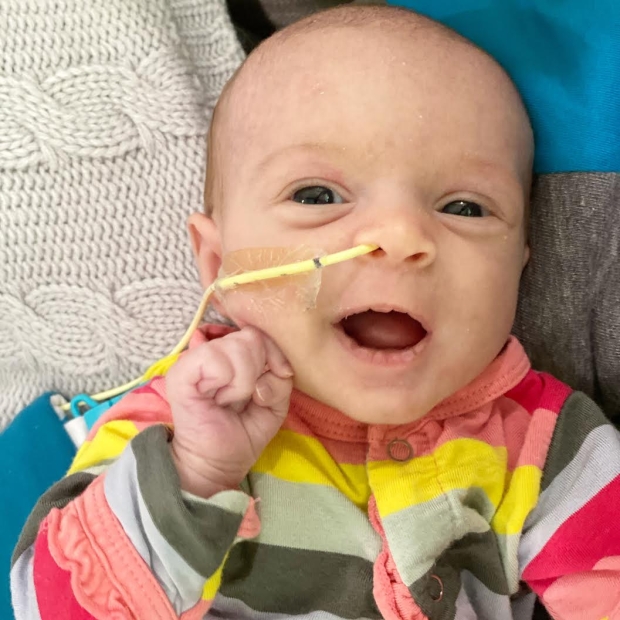
(image provided by Patti Murin)
Take me through the surgery and recovery, and your emotions from then until now.
Colin: We knew we had great doctors taking care of us, and it being as stupidly scary as it is to hear "Your child has a hole in her heart," it was reassuring to know that it wasn't uncommon. Our surgeon was like, "I do this all the time. It will be fine." But it became very real when we got admitted to the hospital the first time, and it became very real when we had to take her in for the actual surgery.
Patti: We live right across the Park from the hospital, and we chose to wait at home. The surgical assistants were really amazing. They texted every single hour, so we always knew where they were in the process. The surgeon had such a calm demeanor. It was fascinating to hear him explain it. This is open-heart surgery, being done essentially the same way that they've been doing it since it was invented. You're talking about sawing through her teeny little breastbone, and stopping her heart, and putting her on a heart-lung machine. One of the things that made me feel better was, they said, "It's not like she's 50 years old and has used her heart for 50 years." This is a brand-new organ, so it's going to heal very quickly.
Colin: The best part of our story is that it was a massive success. Slowly, we're getting to the place where we just have the normal stresses of having a newborn in the house.
Patti: Just in the last week, she's made a leap in development. She smiles so much and she's learning how to laugh. It's so funny, you never think of someone having to learn how to laugh, but she's learning how to do all these things we find instinctual.
Colin: We got to take the NG tube out, so there's less stress in making sure that she's taking in a certain amount of food and gaining weight. We're slowly chipping away at all the things we've been living with for her entire life.
Patti: Easy is not the correct word.
Colin: No.
Patti: But there's so much less around it. We understand now why parents are like, "We checked to see if they were breathing a million times." We've always been able to hear her breathe from far away. So now we're like, "Hello? Hello?"
Colin: I was talking to her surgeon after we brought her home and I told him that it felt like I had a whole new baby. Unless you had kids before, or twins where one has it and one doesn't, you don't really know how bad it was. The way she breathed was all we knew. People told us it wasn't supposed to be that way, and we were like, "Maybe it's not so bad." Turns out, it was.
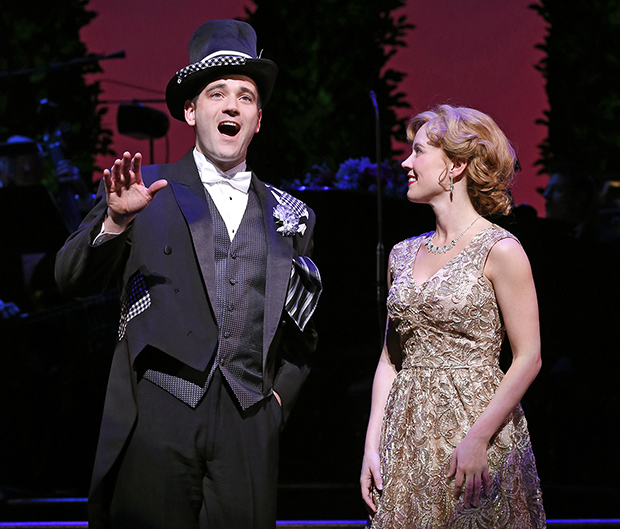
(© Carol Rosegg)
We have to spotlight the doctors and nurses, because they're rock stars.
Patti: Dr. Miwa Geiger is her primary pediatric cardiologist. Dr. Peter Pastuszko was her surgeon, and Dr. Howard Seiden is another pediatric cardiologist we worked with. But it's every single person in the hospital. The maintenance staff. The security staff. The desk staff. The nurses made you feel like you were the only people they were taking care of, but they have so much going on.
Colin: It's amazing what these people do, and there's no way you can properly thank them. You leave the hospital and hope to never see them again, but at the same time, you want to remember them as dearly as possible. I started crying every time we went to say goodbye to somebody because I felt like I couldn't do justice to what they meant to us.
Patti: Normally, we would have been hugging them. That's the whole thing about the pandemic. It's still going on and they're still doing their jobs. They were still doing their jobs in March and April in New York City when things were so insane.
Colin: It's just incredible, it really is.
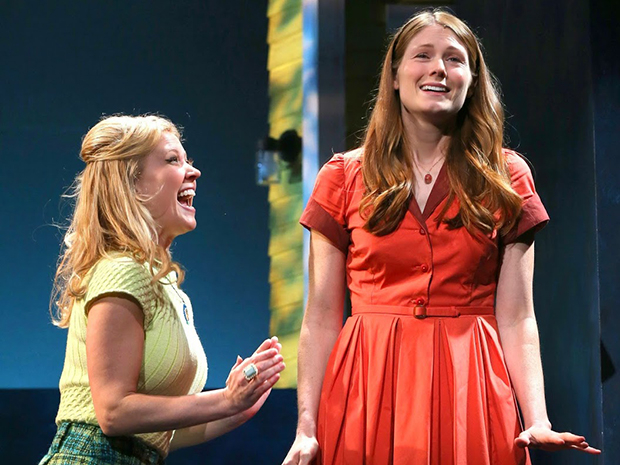
(© Joan Marcus)
What's the best piece of advice you can give new parents who are going through a similar situation?
Patti: If there's a way that you can connect with other parents who have gone through this, do it. I found an Instagram account that I ended up following, a woman who decided to document her son's surgery, which was three weeks before ours. I would follow it in real time, because it was a peek into the world of what it would look like, even though it wasn't necessarily the same. And, lean on your people. If someone asks if they can help, say yes. Tell them to please order you dinner, because you'll forget to do it on your own.
Colin: It was helpful that there were people who would just call to check in. It made things a lot more palatable. If I didn't want to talk about it, I wouldn't have to. But if I wanted to say how much it sucked, it was awesome to know that there was somebody who would be like, "Yeah, this sucks. I'm sorry." It was also really helpful just to have family and friends and Patti. There was one point where I said to Patti, "I want to live in the 'suck' today. I want to live in the fact that this just blows." And we did. And it was OK. I want that to be an OK thing for people to do.
And now you're holding a beautiful baby.
Patti: A baby who eats like a champ.
Colin: And isn't yelling at me.
Patti: Isn't yelling at you right now. She's just the best.
Colin: Yeah.
Patti: [looking at Cecily] Yeah, you are.
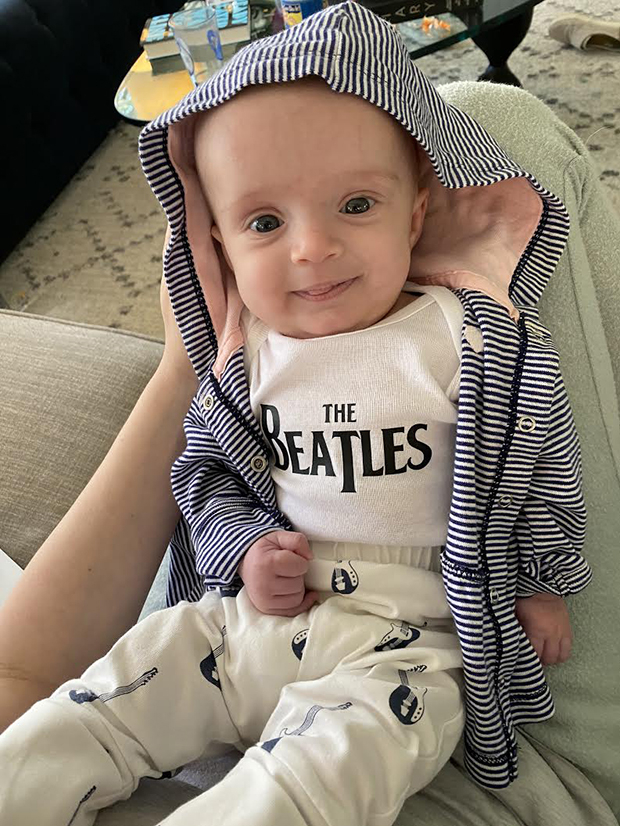
(image provided by Patti Murin)







